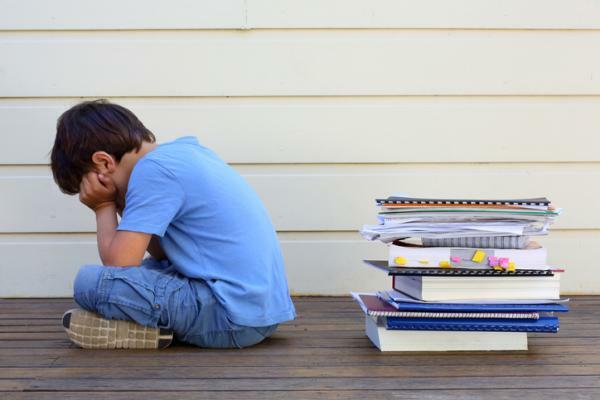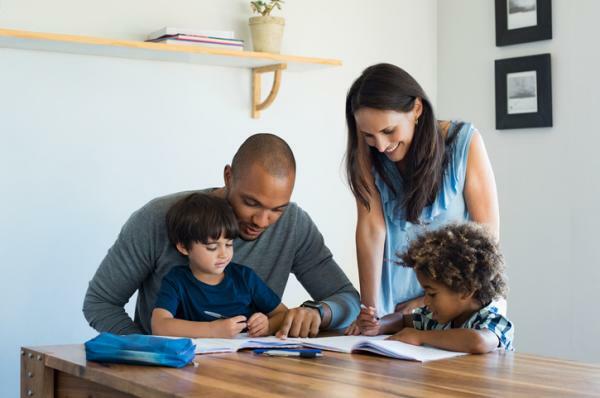
Learning problems or difficulties are a series of neurobiological alterations that affect the acquisition and management of mathematical and reading-writing processes. They are frequently detected in childhood, since they affect school performance and, sometimes, the ability to relate social, and it is at this stage where the child begins to develop her skills, giving rise to evidence of her problems. However, we must bear in mind that each infant has a different learning pace, and slowing down does not mean having learning problems.
If you want to know why your child has learning disabilities and how to help him, we invite you to continue reading this article from Psychology-Online: How to help a child with learning disabilities.
To know if your child has learning problems, you must look at different aspects. Here's how to tell if your child has learning disabilities, paying attention to the most important and common aspects:
- Presents motor difficulties: This can be detected when writing, drawing, cutting, walking, among others.
- Reading difficulties.
- Another warning sign to think that the child may have learning problems is the fact of having difficulties following directions simple.
- Difficulties in laterality (left-right) and difficulties in the spatial notion (top-bottom, front-back…).
- The aspect that could be considered the most common to detect learning problems refers to the difficulty performing tasks and school exercises, which include reading, writing, and arithmetic.
- Presents difficulties in the notion of time: Difficulties in differentiating concepts, such as yesterday, today, tomorrow, and other concepts related to time, schedules and scheduling. This can cause the infant, at times, to feel disoriented.
- Another red flag to watch out for are coordination difficulties. These difficulties affect the coordination of the hands and the coordination of the body in general, so Therefore, the child's motor skills are affected, for example the movements required for writing.
- If the child shows a slow learning of literacy, it may be a small alert that is should take into account, although it should be taken into account that each infant responds at their own rate of learning. In any case, learning from it should be reinforced.
- Difficulties understanding the content of texts.
- Another aspect to consider are the frequent spelling mistakes, especially if they occur in the copying of texts.
- Take into account typical characteristics of the different types of learning disorders as the dyslexia, dyscalculia, and other neurodevelopmental disorders. Among these characteristics we can find the inversion, omission and addition of letters or numbers, among others. Here you can find specifically how to know if your child has dyslexia.
If your child has learning disabilities and you wonder why, you should know the following. There are different causes that cause learning problems, but we must differentiate two main types of causes that explain the origin of these problems:
1. Neuropsychological causes
In the first place, we find the neuropsychological causes that refer to brain injuries, neurological alterations, inherited alterations or deficiencies, physiological conditions (characterized by the malfunction of an organ or system), among others.
2. Environmental causes
Second, we find environmental causes, which include different factors external to the child in question:
- Family and sociocultural factors: among these factors we find the influences of both the family and society, for example, the attitude of the family in relationship to culture, mother-child interaction, family discipline, socialization techniques, language experiences, among others. It should be noted that language development is affected, specifically, in environments unfavorable social and cultural, and in most cases it manifests itself with a vocabulary reduced.
- Food factors: a deficient or inadequate diet or, in other words, malnutrition, can be associated with cultural ignorance and affect different psychological variables of the child. The human brain develops at two different times, before birth and the first years of life after birth, therefore one Malnutrition in these two stages can have irreparable negative effects on the child's brain development, leading to possible problems in the learning.
- Factors related to institutional and methodological deficiencies: this factor refers to three elements related to school activity. First, teacher-student interaction, taking into account the preparation and qualities of the teacher, his capacity for contact, his relationship with the student, his methodology, his experience in didactic practice, among others. In second place, the school institution, it should be noted that some studies relate learning difficulties to the structure of the system school, the influence of the school program proposed by the educational institution, the number of students per classroom, etc. Finally, the companions, since the lack of popularity of children with learning disabilities and negative prejudices towards these students, promote low self-esteem in students with difficulties.
- Personal factors: these are factors related to the infant's personality and emotional factors. In addition, we must bear in mind that an emotional disorder can inhibit basic processes and make it impossible to develop the expected abilities of the child.

In this section we want to respond to a common request from parents in child psychology consultations: my son has learning problems, how can I help him? If your child has learning disabilities and you don't know how to help him, here we will show you different ways to do it.
1. Contact the school
How to help a child with learning disabilities? First of all, it is very important to contact the school in order to inform the teachers of your child's situation. In this way, from the school they will be able to take measures to be able to take care of your child taking into account her situation. In addition, communicating with the school can also allow them an exchange of information about the child's learning that can be very useful.
2. Contact a specialist
Second, and if deemed necessary, it may be very practical to contact a specialist outside the school, so that the child will be able to work on their problems with the support and help of the specialist and, in addition, they will be able to work together between the school, the specialist and the family. ¿When to go to the child psychologist? When the child's behavior or difficulties significantly affect her development and normal life. It is also important to bear in mind that the specialist may recommend a series of activities that Parents can carry out with their children at home, in order to improve their problems of learning.
3. Recommendations for Parents of Children with Learning Disabilities
Finally, how to help the child at home? Well, the child can be helped in relation to emotion, values, study techniques and habits and, finally, in relations with the school.
In relation to emotional and values education: parents should try to promote motivation, self-esteem and self-confidence in the child. They should not focus the child's difficulties on a lack of ability, but should demonstrate to the child that it is an inappropriate form of work that must be relearned and modified to learn correctly, although it requires their effort and will and, they must value the efforts of the boy.
In relation to habits and study techniques: parents should help with school work to facilitate its completion, such as: explaining and clarifying doubts, correcting spelling mistakes, among others. They can also help them study through concept maps, visual schematics, and summaries, since they this way children with learning difficulties tend to learn better, quickly and with less difficulty. In addition, the fact that create a study habit at home, in a quiet and quiet place where the child can do her homework and work. Creating a detailed study schedule can also be a very advantageous strategy. Finally, it is also recommended to carry out joint activities between parents and children, such as, reading aloud, dictating, playing games that promote learning and improve her difficulties, and so on.
In relation to the school: as we have said before, it is very beneficial to be able to work together and collaborate with the school, so that a regular contact with the tutor of his son.
This article is merely informative, in Psychology-Online we do not have the power to make a diagnosis or recommend a treatment. We invite you to go to a psychologist to treat your particular case.


